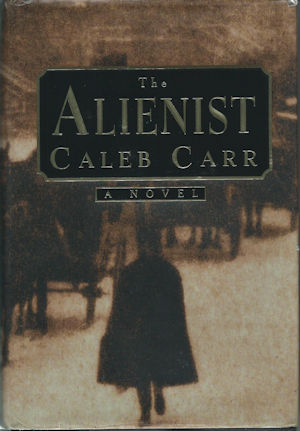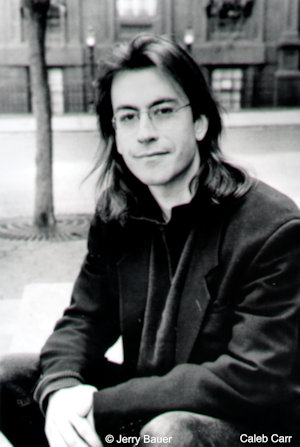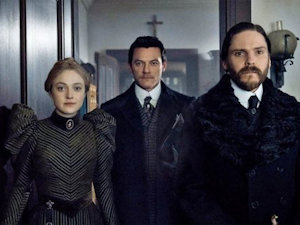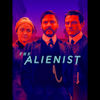The Alienist - Book Review
 | | The Alienist |
As the Nineteenth Century comes to an end, New York City is on the verge of chaos. Radical reforms are being pushed through the city's police department in an effort to weed out corruption, spearheaded most prominently by a pre-presidential Theodore Roosevelt. Forces both seedy and respectable resist this change with every ounce of power they can muster, and with a twisted serial killer stalking the rooftops and leaving behind the mutilated bodies of child prostitutes, they seize this opportunity to foment anger, anxiety, and fear among the poorest and most vulnerable. Enter Dr. Lazlo Kreizler, a psychologist known in those days as an "alienist," who has the idea--nearly a hundred years ahead of its time--to catch the criminal by studying his crimes through the lens of what would one day be called criminal profiling. Kreizler, a maverick in his own field, is as distrusted and despised as the serial killer himself, and so he must work in the shadows, assisted by a small group of like-minded misfits, to put a stop to the killings once and for all.
With the limited series adaptation of the novel debuting Monday night on TNT, it seems a good time as any to revisit an old friend who has enjoyed a prominent place on my bookshelf for over twenty years. Despite its well-worn subject matter and predictable procedural aspects, The Alienist by Caleb Carr is a remarkable book that feels fresh, inventive, and provocative, even a quarter century after its initial publication. Mixing equal parts history, psychology, philosophy, action, politics, and an endlessly layered murder mystery, Carr rises far above the genre staples of the simple detective story to present something not only relevant and intelligent, but wildly entertaining.
There are three things that make The Alienist work, on top of Carr's admirable prose: its well-researched historical setting, the detailed mystery at its center, and the deeply developed characters who carry us through. If any one of these things failed, the book wouldn't have been as successful, and it wouldn't likely be getting the big budget limited series treatment today.
We'll start with the setting: 1896, Lower Manhattan. While a lesser novel would be content to put a story here without bothering to intertwine itself with any cultural context, the themes and ideas of The Alienist could only work at this time and place. Carr doesn't shy away from the details, either, doing his homework so well you'd swear he was a time traveler. In places, it feels almost like he's offering us brief history lessons, but they are all about interesting things like the ebb and flow of organized crime in the city or the infamous exploits of America's first celebrity serial killer, H. H. Holmes. He not only includes references to other big names like soon-to-be-president Teddy Roosevelt, iconic philanthropist James Pierpont Morgan, and legendary gangster Paul Kelly, but he makes them crucial characters in the tale being told. Roosevelt, in particular, is given a starring role, and Carr infuses him not only with all the bombast and energy he was known for, but also with a human aspect that makes him feel more real than the man we read about in historical texts.
 | | Alas, his other books just aren't as great |
He is also very careful to keep our characters grounded to that time and place, making sure they don't possess anachronistic knowledge, non-existent forensic techniques (though one character's rampant use of fingerprinting feels like it might be pushing things), or ways of thinking that had yet to truly develop. This is especially admirable since most of the main characters are people who are way ahead of their time: Dr. Kreizler is grasping at the primordial ooze of forensic psychology at precisely the earliest moment it could have possibly existed; Sara Howard is strong-arming her way into a sexual revolution that wouldn't be realized until her grandchildren were adults; etc. While these outliers of contemporary thought (contemporary for them, I mean) would feel wildly out-of-step in a less well-developed historical context, they feel as though they belong in 1896 New York no less than Roosevelt himself.
Carr uses history the way a great fiction writer should. It's not only contextual and important, but the roadblocks it puts up--roadblocks that simply wouldn't exist if the story were set in modern times--are not annoying obstacles to write around, but critical plot points that help build tension, strenghten our characters, and drive the narrative. Even when he is obviously deviating for the sake of a neat historical cameo of sorts (there's a particularly memorable part where our two main heroes interrogate the Boston Boy-Fiend, Jesse Pomeroy, a real and fascinating killer from history), it feels surprisingly organic.
That gets me to the second aspect of this story that makes it work so well: the mystery. Never does the story stray far from the deeply interwoven mystery at its heart. No digression is pointless, and every scene reveals some new tidbit of information that helps to unravel what's going on beneath the surface. While the majority of the puzzle is naturally the serial killer murdering child prostitutes on the city's rooftops, it becomes quickly apparent that there's more going on, with odd, seemingly inexplicable things like two priests--one Catholic and one Protestant--working together to try to silence the families of the victims using both money and brute force. By the end, after the puzzle has been methodically and fully put together, it all makes perfect, logical sense in a way that is truly astounding.
But there's more mysteries to unravel than even those. The interpersonal relationships of our characters are kept in the background by a protagonist who, for all his intelligence and skill at managing the street, is kind of an idiot at recognizing the importance of certain social cues and personality traits. Therefore, much like the murder mystery, the main characters are slowly revealed in more depth and nuance as the story goes on, including the titular alienist, Dr. Kreizler, who competes only with the killer himself in how deep his personal rabbit hole goes. At the start, he seems little more than an idiosyncratic genius--a little too similar to Sherlock Holmes, if I'm being honest--but as more is unveiled about what drives him and what he cares about, the less archetypal and the more intriguing he becomes.
 | | Even if the series is terrible, give that casting director a raise |
This is because Carr puts as much effort into his characters as he does the setting and the mystery. Each character--even the relatively normal protagonist, John Moore (from whose point of view the book is written)--is given a detailed backstory and psychological profile. It's rarely spelled out in detail, but the more time you spend with each, the more you learn. Even fairly insignificant characters are given weight and dimension, and as the book deals in themes of psychological determinism and free will as an illusion of context brought about by behavioral traits deeply ingrained by childhood, it is important that we see these things reflected in every man and woman who inhabits Carr's world.
The most thought and depth is given, naturally, to the killer. Even though the book is named after the fascinating character of Dr. Kreizler, it is really about this largely unseen menace stalking the seediest parts of the big city. In essentially plotting a course through the unmapped waters of criminal profiling, our heroes come to learn about him from the inside out, ultimately learning far more about what makes him tick than he himself would be capable of understanding. Carr's homework is especially notable here, as the killer is a wonderful amalgamation of at least a dozen real life serial killers from Jack the Ripper to Albert Fish. Serial killers in novels such as this are rarely as well-crafted and realistic as this one, but I can't say too much about that without spoiling things.
Ultimately, as I consumed the book for perhaps the sixth or seventh time this last week, I have lost none of my love and respect for The Alienist. Of all the books I've read that deal with similar subject matter or dabble in historical fiction, it is unquestionably my favorite, but even if I try to look at it from a purely objective point of view (which I admit is insanely difficult for me), I can find little to say to detract from its greatness. (Okay, so maybe the climax gets just a tad bit silly...) This is, quite simply, an important work of literature that everybody who likes the genre should read. I can't imagine the series will live up to this book's fine example, and I don't know how they will put most of it on network television. I will say I am excited by the cast, especially Daniel Brühl, who is absolutely perfect for the role of Kreizler. [Check out my review!]
FINAL SCORE:





Just read it, if you haven't already.
|
-e. magill 1/18/2018
| MORE LIKE THIS: |

|
The Alienist - TV Review
TNT's much anticipated adaptation of Caleb Carr's novel has finally aired. Does the Geek approve? [3/29/2018]
|
|
|
|
|